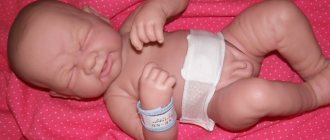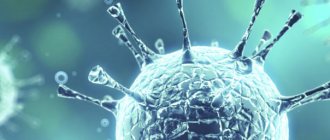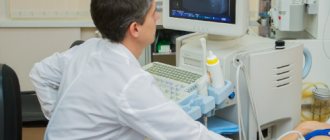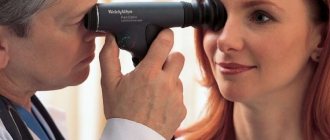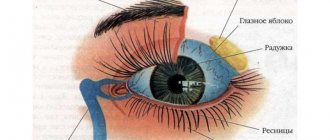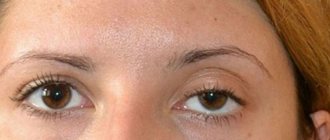Signs of PMS
Insomnia is one of the main symptoms of PMS, and it can also be accompanied by other manifestations:
- excessive nervous excitability;
- increased sensitivity, soreness of the breast and its increase in size;
- swelling due to fluid retention in the body; during PMS you can gain up to 2 kg in weight;
- headache up to migraine;
- dizziness;
- nausea and vomiting;
- muscle pain, joint pain and nagging pain in the back;
- dry mouth, thirst;
- constipation or diarrhea, frequent urination;
- changes in food preferences, a woman really craves salty or sweet foods, and develops intolerance to alcohol;
- slowness of reaction, fatigue, general loss of strength or, conversely, excessive influx of energy;
- increased heart rate, rush of blood to the head;
- increased activity of the sebaceous glands, which causes acne;
- unreasonable and sudden changes in mood;
- feeling depressed, depressed, melancholy;
- panic, aggression, tendency to violence;
- thoughts about suicide.
What causes PMS and insomnia
Insomnia before menstruation is associated with hormonal imbalances and the balance of nutrients in the body. First of all, the level of testosterone and progesterone decreases significantly, because they are responsible for the maturation of the egg and spend all their energy on fulfilling this noble mission. Their deficiency affects a woman’s condition negatively:
- the level of monoamine oxidase, a substance produced in the brain, increases; its excess quickly leads a person to a depressive state;
- the production of serotonin, a hormone that gives us a good mood, vigor and ability to work, decreases;
- an increased dose of aldosterone, a hormone produced in the adrenal glands, which leads to serious changes, in particular, increased systemic blood pressure, edema, congestive heart failure, etc.
The amount of minerals in the body also drops during menstruation and 7-10 days before it begins.
Calcium deficiency is especially difficult for women; it contributes to the normal functioning of the central nervous system and is responsible for the proper functioning of the muscular system and blood clotting. A lack of microelement causes pain in the limbs, cramps, increased irritability, and lack of normal sleep.
A decrease in blood glucose levels also negatively affects the condition. It is she who regulates the balance of progesterone and estrogen and is responsible for their penetration from the blood into the cells. This leads to the fact that the amount of free progesterone is steadily increasing. This condition leads to improper functioning of the central nervous system, resulting in irritability, insomnia, anxiety and other disorders.
Causes of the problem
Insomnia during menstruation, which is part of PMS, occurs 5-7 days before the start of menstruation. During this period, under the influence of hormonal changes in a woman’s body, a number of chemical processes are launched. In tissues, the usual ratio of elements that are responsible for the vital functions of the body is disrupted. For women in good health, such changes most often remain almost unnoticeable, discomfort is minimal and goes away within 2-3 days.
Persons with weakened immunity, physical inactivity, somatic diseases, who neglect proper nutrition or personal hygiene, risk experiencing a lot of unpleasant sensations.
Manifestations of insomnia before menstruation can be a consequence of the following reactions:
- deficiency of testosterone and progesterone, a drop in serotonin levels - provokes instability of the emotional state, tearfulness, irritability, bad mood;
- deficiency of calcium and/or glucose – causes disruptions in the functioning of the central nervous system;
- gynecological diseases - thrush, chronic endometriosis. In the first case, the cause of insomnia is the clinical picture of the pathology, which often intensifies during menstruation. Endometriosis implies the presence of an inflammatory process, due to which the onset of menstruation may shift by several days. In this case, hormonal changes occur according to a schedule, due to which PMS lengthens, causing physical and psycho-emotional discomfort.
Deviation may occur due to thrush.
In all women, without exception, before menstruation, the nervous, endocrine and cardiovascular systems begin to work differently. Less than 1% of female representatives can say there is a complete absence of changes in their condition during this period. Minor discomfort is considered normal. The development of insomnia is not included in the list of acceptable symptoms - it is better to consult a doctor immediately with this symptom.
Drug treatment
If a girl’s menstruation is accompanied by severe PMS and sleep disturbances, she should consult a doctor for advice. The problem is solved by a gynecologist, neurologist or somnologist (a doctor who studies and treats sleep disorders). In some situations, additional consultations with other specialists may be prescribed.
Drug treatment may include the use of the following drugs:
- Tranquilizers, sedatives and antidepressants. These are potent drugs that are used to treat neuropsychiatric disorders. They have also been shown to be effective in relieving PMS and insomnia during or before menstruation. They are taken only under the supervision of a doctor, the dosage is selected individually in each case, such drugs are not intended for long-term use.
- Non-steroidal anti-inflammatory drugs. Prescribed to relieve headaches and migraines, and can also be used for preventive purposes.
- Diuretics. They are aimed at removing fluid accumulated in the body and are prescribed only in extreme cases, as they “wash out” beneficial microelements, creating their deficiency. Reception begins 5-7 days before menstruation.
- Hormonal therapy. Prescribed only in particularly difficult cases. Patients are artificially administered progesterone and other hormones, the amount of which decreases significantly during PMS.
What are the dangers of insomnia during PMS?
Regular sleep problems, characteristic of premenstrual syndrome, negatively affect both a woman’s physical health and her emotional state. This period for the female body is always associated with serious stress, associated, first of all, with the ongoing hormonal shift. At the same time, general weakness increases, which with the arrival of menstruation only intensifies due to blood loss. Accordingly, during this period, a good night's sleep and rest are especially important, which will help you quickly restore strength and return to the usual rhythm of life.
Insomnia can lead to even more irritability
In addition, due to insomnia during menstruation, irritability, anxiety, nervousness and depression, which already cause women a lot of trouble during this period, can significantly increase. But any disturbances in the functioning of the nervous system always have negative consequences, which may manifest themselves in the future during pregnancy or childbirth. That is why serious problems with sleep during PMS and during menstruation cannot be ignored, treating them as just temporary difficulties that will disappear on their own in a couple of weeks.
Alternative Methods
To alleviate PMS and normalize sleep during this period, you can use not only synthetic drugs, but also homeopathy. Such products are distinguished by their safety and high efficiency; they have practically no contraindications.
Let's look at the most popular medications of this type.
- DreamZzz. A natural remedy whose effectiveness has been proven in clinical trials. It is based on the natural component gaba alishan, which regulates glucose utilization, improves blood circulation, strengthens memory, and fights insomnia and melancholy. The composition also includes the lofant plant, it has a general strengthening effect on the body, stabilizes blood pressure, and calms the nervous system. The beaver stream increases overall tone and improves mood, calms and relieves spasms from the smooth muscles of internal organs. A collection of 32 medicinal herbs promotes relaxation and quick sleep. For PMS and insomnia, the product will give the desired effect after the first use.
- "Sonylux". A completely natural homeopathic preparation, which also includes alishan gaba, lofant extract, beaver stream and a collection of 32 herbs. All components enhance each other’s action, which has a beneficial effect on the well-being of patients. The product fights anxiety and aggression, speeds up falling asleep, makes sleep sound and uninterrupted, relieves chronic fatigue, improves mood and protects the nervous system from overstrain. In just one course you can completely get rid of problems with night rest.
Self-remediation
If you suffer from complicated PMS and sleep disorders during this period, you can take measures to prevent the disorder. They consist of correcting the rest and wakefulness regime, paying attention to diet and physical activity.
Let's take a closer look at how you can help yourself.
- Sports activities. It is not necessary to go to the gym and carry iron; to normalize the condition before menstruation and eliminate the manifestations of PMS, regular exercise or jogging before bed will be enough. Physical activity leads to the production of endorphins - hormones of happiness. They effectively combat stress and improve mood.
- Ventilation of the room. You need to sleep 8-9 hours a day; if you devote less time to rest at night, you risk getting a fair amount of irritability before the onset of menstruation, loss of normal ability to work, and the manifestation of other PMS syndromes. Before going to bed, ventilate the room, use aromatic paws with soothing oils, take baths with herbal infusions, drink a glass of warm milk with honey or chamomile tea.
- Proper nutrition. Before your period begins, you need to make sure that your nervous system does not succumb to severe irritation and that the amount of nutrients in the body does not decrease. To do this, limit the consumption of fats, cheese, chocolate, coffee, and give up alcohol. These products increase excitability, provoke headaches, migraines, and mood swings. Eat more fiber, give preference to orange fruits and vegetables, greens, and grains. To maintain stable blood insulin levels, eat small meals 5-6 times a day.
- Vitamin supplements. Introduce nutritional supplements into your diet. You should consume 50-100 mg of vitamin B6 and 250 mg of magnesium per day. Additional use of iron and calcium will also have a positive effect on your well-being and night's rest. Since the immune system fails during PMS, your body becomes susceptible to bacterial, viral and fungal diseases. To prevent them, make it a rule to consume vitamin C.
What you can do yourself
If there is no desire or opportunity to seek medical help, then you can cope on your own. This will work if the problem is only related to the monthly cycle.
The first step is to refuse the help of ineffective and untested methods. All homeopathy and traditional medicine will not help here. It is necessary to slightly adjust your lifestyle so that insomnia during menstruation no longer bothers you.
- Moderate physical activity and an active lifestyle are the best prevention of insomnia.
- Ventilating the room before going to bed should become a rule.
- Less stress and conflict will have a beneficial effect throughout your life.
- Before your period begins, you need to give up caffeine, nicotine and alcohol.
- Evening walks in the fresh air help you fall asleep faster.
- An active lifestyle will have a beneficial effect on the entire body.
- Follow a diet that excludes fatty, fried and high-calorie foods at least during menstruation and a few days before it begins.
If all the measures taken do not help in any way and insomnia recurs in subsequent cycles, then you will have to contact your doctor about this problem.
In conclusion
Insomnia occurs in almost 60% of women who suffer from PMS. Modern medicine has found many effective methods to eliminate this specific problem, and there are also remedies from traditional healers and homeopathic medicines.
The woman herself can also influence the state of the body before menstruation; all you have to do is adjust your lifestyle.
Regardless of what methods you decide to deal with the problem, you should first consult a doctor, since the symptoms of PMS and serious illnesses are quite similar to each other.
Author: Dasha Pashchenko
